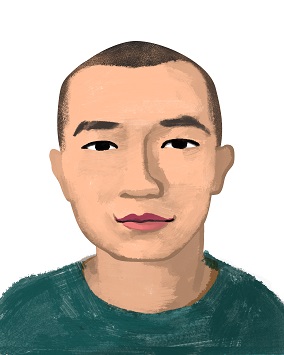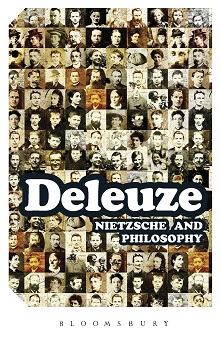Embora seja conhecido que ler ao acaso as frases sobre as quais os olhos se debruçam é muitas vezes julgado “perigoso” na medida em que implica o risco de “compreender mal” o sentido de um texto, não deixa de ser uma leitura “sem contexto” desta obra de Gilles Deleuze (1925-1995) que gostaríamos de propor aqui: o que chamamos de uma “má” leitura, uma leitura criativa ou mesmo uma leitura em que o sentido permanece livre, mas sobretudo uma leitura que viaje entre línguas.
Imaginemos ter um café quente na mão sob o sol berlinense e estar silenciosa e silencioso na histórica sala de leitura da Biblioteca Central de Macau. O ambiente, as circunstâncias variam, os sentidos diferem com eles enquanto colocamos Nietzsche e a Filosofia de Gilles Deleuze na mão para ler as primeiras páginas. As primeiras páginas são as que, pelo menos, vêm primeiro. Logo, desfolhando, alguns fragmentos do texto chamam a nossa atenção, retêm-na por um momento e depois deixam-na partir e mudar a página.
Nietzsche e a Filosofia, publicado em 1962, é um dos livros que nos permite compreender tanto o pensamento de seu autor quanto o do filósofo de quem o livro fala: Friedrich Nietzsche (1844-1900). É a tradução inglesa (1983, 2006) do advogado de profissão, Hugh Tomlinson, disponibilizada pela Biblioteca Pública de Macau que lemos: cinco capítulos, 75 pontos e uma conclusão. Traduzido em pelo menos duas dezenas de línguas, Nietzsche e a Filosofia oferece exactamente uma excelente oportunidade não apenas para explorar mil formas de (mal-) entender Deleuze e Nietzsche, mas também para reflectir como a tradução suscita a problemática da percepção intercultural desses dois filósofos, hoje ambos mundialmente conhecidos.
“Quando se escreve, sabe-se que uma língua é, na verdade, um sistema que está longe do equilíbrio, é um sistema em perpétuo desequilíbrio. [...] a língua é feita de todo tipo de correntes heterogêneas em desequilíbrio umas com as outras.” (Tradução brasileira disponibilizada no https://askesis.hypotheses.org/918)
Tais são as palavras do filósofo em resposta à pergunta sobre o que faz o estilo de escrita, colocada pela sua aluna jornalista Claire Parnet para o documentário “O abecedário de Gilles Deleuze”, divulgado entre 1994 e 1995. Se Deleuze é considerado como fazendo parte dos filósofos mais difíceis de ler, isso deve-se sobretudo à particularidade do seu estilo livre de escrita, cuja espontaneidade faz com que o agenciamento (na terminologia de Deleuze) das ideias se torne muitas vezes duro acompanhar para as leitoras e os leitores. Esse estilo livre, e é isso que essa citação nos explica, reflecte a concepção que o filósofo francês tem da escrita.
Escrever é colocar-se no seio de um sistema “em desequilíbrio perpétuo” e aperceber-se das “correntes heterogéneas” a partir das quais uma língua se forma. Entretanto, embora seja mais incomum na filosofia, Deleuze faz uso deste desequilíbrio em Nietzsche e a Filosofia, onde, como era do seu hábito, deixa-se levar livremente de um sujeito a um outro no fio das suas reflexões sobre os diferentes conceitos-chave da filosofia de Nietzsche.
Se o estilo original de Nietzsche é mais enquadrado do que o de Deleuze, a sua escrita repleta de alusões e neologismos, relembra-nos certos aspectos de Deleuze e pode-se supor, sem se arriscar demasiado, que foi uma grande influência para ele. Tudo acontece aqui como se os livros de Nietzsche tivessem servido de modelos para a composição de Nietzsche e a Filosofia, que se compõe de pequenos parágrafos agrupados nos capítulos entre os quais os conceitos de Nietzsche são tanto comentados como enriquecidos com as visões deleuzianas.
Redigido como um romance que parece escapar a qualquer linearidade cronológica, Nietzsche e a Filosofia parece ter sido composto da mesma forma que a maioria dos livros de Deleuze sobre a sua própria filosofia. A ordem de leitura é deixada à escolha das leitoras e dos leitores e onde a compreensão de um capítulo não depende da tomada de conhecimento do precedente. Ao longo das 200 páginas do livro, os diferentes temas, ou melhor, os diferentes pontos parecem, à primeira vista, convencionalmente agenciados - de novo, na terminologia deleuziana - e classificados. As diferentes partes do livro, no entanto, estão amplamente inter-relacionadas e convidam a uma leitura livre: a leitura de um conjunto de fragmentos. Nas primeiras páginas, por exemplo, temos uma primeira análise do anti-hegelianismo de Nietzsche que será detalhado num ponto do último capítulo.
O risco é grande de uma filosofia ser desacreditada se fôr reduzida a fragmentos, sejam escritos ou falados. Mas é assim que lemos este livro: por capítulo, um ponto aqui e ali, um parágrafo, uma frase, uma palavra, uma pontuação lida em voz alta, as sílabas que se sucedem. Inspirada e inspirado no olhar sobre a pintura da filósofa Jacqueline Lichtenstein (1947-2019), ao mergulhar o olhar às vezes tão perto numa língua até esta se tornar um conjunto de letras, traços de caráter ou abjad (escrita de origem árabe) a desconstruir - Nietzsche e a Filosofia se traduziram tanto em chinês ou japonês como em árabe ou persa.
Não ousaríamos fingir escapar - ou mesmo desculpar - o uso tentador de certas referências exóticas neste texto. Ademais, no entanto, a nossa grande paixão pelas línguas e o prazer quase ilegítimo, que nos levar a entregar-nos ao voyeurismo e ao turismo intelectuais, incita-nos a recorrer à leitura de diferentes traduções de Nietzsche e a Filosofia. E é nessa óptica que desejaríamos apresentar aqui as diferenças de tradução de uma palavra muitas vezes usada por Deleuze: a palavra“sens” (sentido).
A tradução da palavra “sens” nas línguas da Ásia confucionista - em chinês-vietnamita (意義), em coreano-japonês (意味) - aproxima-se do sentido de “significado” enquanto, em português, a palavra “sentido” usado para traduzir “sens” é para nós um termo mais poético: um substantivo que também pode ser usado como particípio passado. Esta tradução portuguesa parece corresponder ao significado da palavra nas línguas europeias, nas quais significa tanto o que uma palavra se refere como o que uma coisa significa.
Também não ficámos surpreendida e surpreendido ao constatar que a palavra usada, em árabe e persa, para traduzir “sens”, possui igualmente os mesmos dois “sentidos” que as suas homólogas europeias. A tradução turca, no entanto, atraiu a nossa atenção. A palavra “duygu” usada nesta tradução tem o significado de “emoção” e “sentimento”. Se, à vista dessa palavra, o exotismo da língua turca nos seduz, ela também nos lembra dos riscos de “mal-entendidos” inerentes à prática da aprendizagem de uma língua, e isso particularmente na leitura de filosofia.
É ao fantasiar um Deleuze ou um Nietzsche multilíngue que lemos Nietzsche e a Filosofia: de olhares rápidos, em pedaços, às vezes palavra por palavra, depois de frase em frase escolhida ao acaso. Um pouco como ler um romance de poesia, tomando as letras tais como são. À busca da etimologia de certas palavras, comparando algumas passagens entre as diferentes traduções e os termos utilizados, quisemos questionar as maneiras de ler um livro de filosofia. Não teríamos o direito de entender “mal” a filosofia ou mesmo entendê-la à nossa maneira, enriquecendo-nos com a nossa própria interpretação, por “falsa” ou “verdadeira” que seja? Não foi precisamente o projecto de Gilles Deleuze de fazer a filosofia de tal forma que pudesse ser lida como um romance sem que nenhum conhecimento filosófico prévio fosse exigido?




